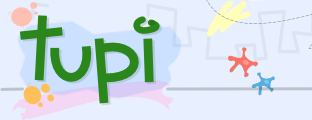
QuestionCopyright.org has pledged $500.00 to the Tupi 2D Animation Software Kickstarter campaign, and we’re posting this to help spread the word.
Please join us and the other project backers, with whatever amount you can pledge! Remember, your pledge is only called in if Tupi reaches their $30,000 goal by September 26th.
Tupi is already runnable code. They’re on version 0.2 right now, and their goal in this campaign is to reach their 1.0 feature set, including installers for Macintosh and Windows. (It’s already packaged for Debian and Ubuntu GNU/Linux; I’ve installed it.)
Our Artist-in-Residence Nina Paley (who also backed Tupi’s campaign personally) explained very well why projects like Tupi are important, in her post “It’s 2013. Do you know where my Free vector animation software is?”. When you’re an artist, you’re dependent on your tools — and that means when someone has a monopoly over your tools, they can play havoc with your art and your livelihood. That’s exactly what happened with Adobe’s Macromedia Flash 8. Read Nina’s post for the details, but basically Adobe decided to remove features from their Flash authoring software, in order to sell those features separately in other programs. As Nina points out, the problem with this isn’t just the extra expense, it’s the increase in workload and production time. And the looming threat that they might do it again in the next version. They can yank the rug out from under their users at any time, and there’s nothing the users can do about it, except refuse to upgrade (which becomes less and less feasible as time goes on, of course).
Free, open source programs can’t do this to their users, because no one has a monopoly over the software. If one group puts out a version of the software that is missing important features, users will shrug and start using a competing fork that treats them better. It also means that if enough artists need a particular bugfix or improvement in the software, they have a path to make it happen — they don’t have to be programmers, as long as they can band together and hire programmers. Users are not vulnerable to arbitrary decisions handed down from management, they way they are with proprietary software. (Of course, the more likely scenario is that artists would band together and just pay Tupi’s original development team to make the necessary changes. The fact that the users have the option to go elsewhere is precisely what makes the original authors likely to be responsive to true demand — a free-market ideal that proprietary software is structurally biased against attaining.)
Tupi has another thing going for it: Nina, an extremely experienced animator who knows the major competing proprietary tool very well, has publicly volunteered to test and provide feedback to open source animation projects, including Tupi. (Nina says “Tupi’s strength is its simplicity; it’s great for kids and anyone new to animation. It doesn’t yet have the power I need to produce feature films, but its development is a good thing for all of us. …”)
So please help spread the word about Tupi’s Kickstarter campaign! (Here are links to retweet or redent our posts about it.) You can read more about Tupi here, and this is their campaign video:
